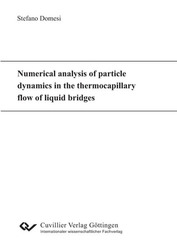| Departments | |
|---|---|
| Book Series (96) |
1381
|
| Nachhaltigkeit |
3
|
| Gesundheitswesen |
1
|
| Humanities |
2370
|
| Natural Sciences |
5408
|
| Engineering |
1795
|
| Engineering | 292 |
| Mechanical and process engineering | 862 |
| Electrical engineering | 688 |
| Mining and metallurgy | 30 |
| Architecture and civil engineering | 75 |
| Common |
98
|
|
Leitlinien Unfallchirurgie
5. Auflage bestellen |
|
Advanced Search
Numerical analysis of particle dynamics in the thermocapillary flow of liquid bridges (English shop)
Stefano Domesi (Author)Preview
Table of Contents, Datei (35 KB)
Extract, Datei (2.3 MB)
Experiments performed under normal and micro-gravity conditions have shown accumulation phenomena of tracer particles (called PAS, particle accumulation structures) in the steady two-dimensional and oscillatory three-dimensional thermocapillary flow
arising in differently heated liquid bridges. In this work the dynamics of small, spherical solid particles immersed in different vortex flows is numerically investigated in order to understand and explain the nature of PAS.
Analytical steady periodic vortex flows have been chosen for a detailed study of the particle-fluid coupling problem. In the light of such results the numerical investigation of the dynamics of particles suspended in the thermocapillary vortex flow arising in liquid bridges has been performed.
Special attention has been payed to the effect of the interpolation of the discrete flow and to the model for the particle–rigid wall and the particle–free surface interaction.
The numerical simulation of the particle motion and the computed accumulation structures are consistent with corresponding experimental investigations.
| ISBN-13 (Printausgabe) | 3869550988 |
| ISBN-13 (Hard Copy) | 9783869550985 |
| ISBN-13 (eBook) | 9783736930988 |
| Language | English |
| Page Number | 126 |
| Edition | 1 Aufl. |
| Volume | 0 |
| Publication Place | Göttingen |
| Place of Dissertation | Universität Bremen |
| Publication Date | 2009-09-07 |
| General Categorization | Dissertation |
| Departments |
Engineering
|
| Keywords | Particle dynamics, Dynamical system, thermocapillary convection, Liquid bridge, Two-phase flow, Particle accumulation structure (PAS), Computational fluid dynamics (CFD), Analytical flow |








